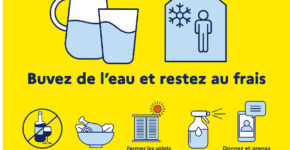Education and ecological transition
Faced with the urgent need to train students in the major issues of climate change, resource depletion and biodiversity loss, the University of Montpellier is actively committed to an ambitious, multi-dimensional training policy geared towards the ecological transition, supported by the Vice-Presidency of Education and University Life and the Vice-Presidency of Environmental Issues.
This policy and the resulting action plan are based on the report by Jean Jouzel and Luc Abbadie, Sensibiliser et former aux enjeux de la transition écologique et du développement durable dans l'enseignement supérieur, and on the Plan climat-biodiversité et transition écologique de l'ESR.
To achieve this objective, the school has chosen to integrate the Ecological Transition dimension into its teaching in a variety of ways: dedicated diplomas, specific teaching units and integration of the Ecological Transition for Sustainable Development (TEDS) into the teaching of the various courses. It has also supported the deployment of technological demonstrators, enabling the development of practical workshops essential to the acquisition of TEDS knowledge and skills by students, the future professionals and citizens of tomorrow.
The TEDS teaching unit for undergraduates
On the recommendations of the French Ministry of Higher Education and Research (MESR), the school has set up specific teaching units dedicated to the ecological transition and aimed at allundergraduates: UE TEDS. The aim is to raise the awareness of all undergraduates, whatever their field of study, to ETSD-related themes, and thus to help spread the culture of ecological transition throughout society and the socio-economic world.
The themes taught cover 4 main areas:
- Climate change, including mitigation and adaptation
- Biodiversity and its preservation
- Resources and availability
- Just transition and social equity
In order to ensure that the courses offered best meet the specific needs of each of the bachelor's degrees, whose content, depending on the field, natively integrates ecological transition issues to a greater or lesser extent, the establishment has chosen to offer UFRs, schools and institutes several implementation methods, which can complement each other:
- Use of the TEDS-UM digital teaching unit created and offered by the school
- Creation by UFRs, schools and institutes of TEDS teaching units tailored to their specific needs.
- UFRs, schools and institutes to create TEDS teaching units based on existing courses.
Integrating TEDS into training courses
In addition to its range of courses specifically dedicated to the ecological transition for undergraduates, the University is keen to train as many of its students as possible to take account of the challenges of the ecological transition for sustainable development in all areas of training. With this in mind, the school is pursuing a policy of integrating TEDS into its various training courses.
In concrete terms, this approach can take several forms: dedicated teaching units within a course, issues addressed from an "ecological transition" perspective, analysis of the ecological impacts of certain activities, case studies focusing on the ecological transition, integration of sustainable solutions into projects... The aim is to develop a cross-disciplinary approach that links TEDS to the various disciplines.
Ultimately, the aim is to equip each student with the knowledge, skills and tools needed to apply these concepts in their future careers, whatever their field of expertise, and to prepare them to become environmentally aware citizens. In this way, the initiative contributes to the training of professionals and citizens committed to the preservation of our planet in their daily lives.
TEDS-related training courses at the UM
Within its 8 UFRs, 7 institutes, 3 schools and 1 component establishment, the University of Montpellier offers a multi-disciplinary range of courses covering the major fields of law, economics, management, political and social sciences, science, technology and health, providing students with a variety of programs tailored to their interests and career goals.
An increasing number of courses include modules dedicated to the ecological transition. Some courses are even entirely devoted to these issues, at bachelor, master and doctorate levels, in national and institutional diplomas and in all the fields covered by the establishment.
By way of example, here are a few diplomas dedicated to the ecological transition in various fields:
- Professional degree in energy management, electricity and sustainable development (IUT Montpellier)
- Professional degree - Studies and development of natural areas (Faculty of Science)
- Master's degree in environmental and sustainable development law and management (UFR D &SP)
- Master's degree in environmental economics (UFR éco)
- Master of Ecological Transition and Circular Economy Management (MOMA)
- Master in Environmental Management (UFR Science)
- University diploma in green finance (UFR éco)
- University diploma in law, sea and coastline (UFR D &SP)
- University diploma in environmental and sustainable development management (SFC)
- European Diploma on Global Challenges for Sustainable Development (Charm-EU)
- Executive MBA Circular Economy and Ecological and Energy Transition (WOAgri)
- Economic evaluation and adaptation to climate change (UFR éco)
For more information, browse our training catalog.



